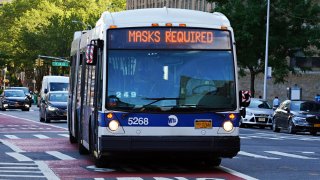
A report by the Office of the Metropolitan Transportation Authority Inspector General is calling on the transit corporation to immediately test employees for alcohol following serious accidents after an audit found that the majority of tests were administered too late.
The MTA Inspector General's report released Tuesday said that 90% of MTA bus employees were tested for alcohol more than two hours after they were involved in an accident --- a timeline in which Inspector General Carolyn Pokorny says may have let at least seven employees off the hook from disciplinary actions.
For subway employees involved in accidents, 88.5% of them were tested for alcohol more than two hours afterward. The numbers are averages from tests conducted from 2017 to 2019.
“Allowing too much time to pass between the accident and the testing of workers creates an unnecessary roadblock, putting the safety of our riders, workers, and others at risk," Pokorny said in a news release, noting that the city police are able to test suspected drunk drivers in a timely manner.
The Federal Transit Administration has a requirement that alcohol tests be conducted as soon as possible, ideally within 2 hours of the accident, Pokorny said.
The main reason that it takes so long for tests to be conducted is the duration of investigations conducted at the accident scene, according to the report. Another reason is the the time required for the employee to travel from the accident scene to the NYC Transit medical center where the tests are conducted.
"OIG acknowledges that these logistical barriers to timeliness are difficult to surmount, but NYC Transit has not made concerted efforts to seek solutions," the report read.
Local
The OIG's audit also found that seven of the delayed tests came back positive for alcohol, though the levels are below the threshold that would have pulled the workers from service. Pokorny recommended that the MTA expedite the testing process by including the use of on-scene test kits or a contracted service provider.
The MTA has accepted the recommendations but a spokesperson for the transit agency says significant resources are required to update procedures.
“The MTA and New York City Transit are fully committed to an alcohol and drug-free workplace. Each year, we test tens of thousands of employees – our testing program is among the largest in the country and it meets or exceeds all federal regulations and guidelines," MTA Deputy Communications Director Aaron Donovan said in a statement to NBC New York. "We agree we could test more efficiently, which is why we are updating our procedures in accordance with the recommendations of this report. This will require significant resources.”
The agency's budget has greatly suffered due to low ridership amid the pandemic. However, Pokorny said the issue of alcohol testing has persisted for 20 years and MTA management has shown lack of urgency to improve the situation.
OIG said it previously released reports in 1999, 2006, and 2019, all reiterating that delayed testing as a problem.



